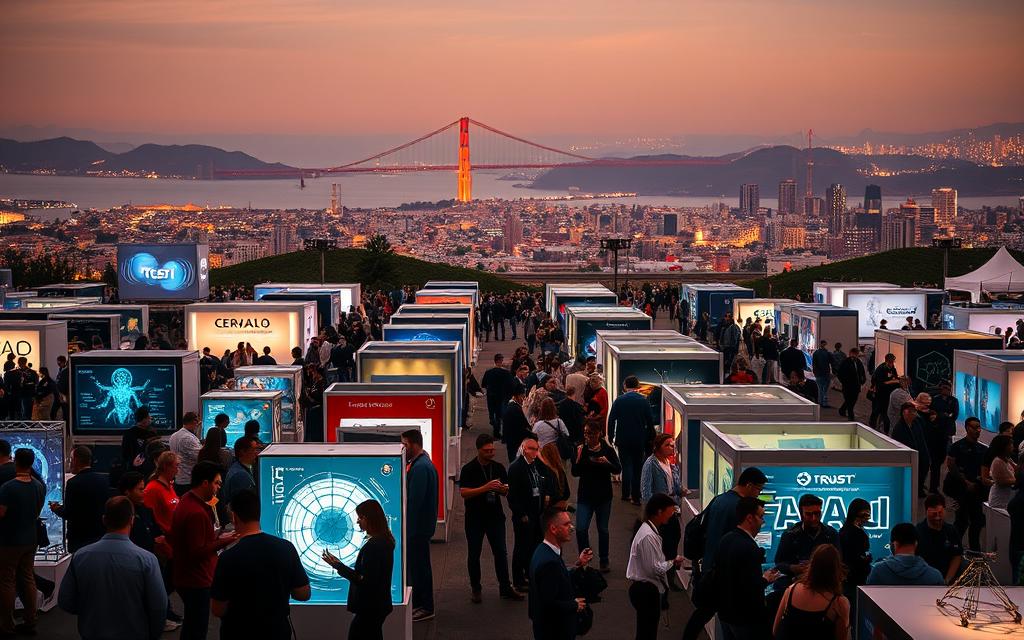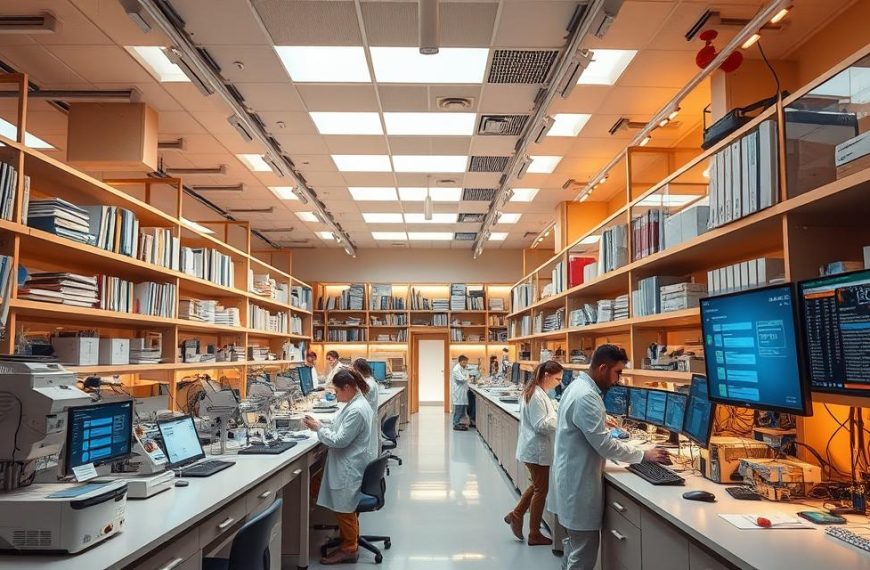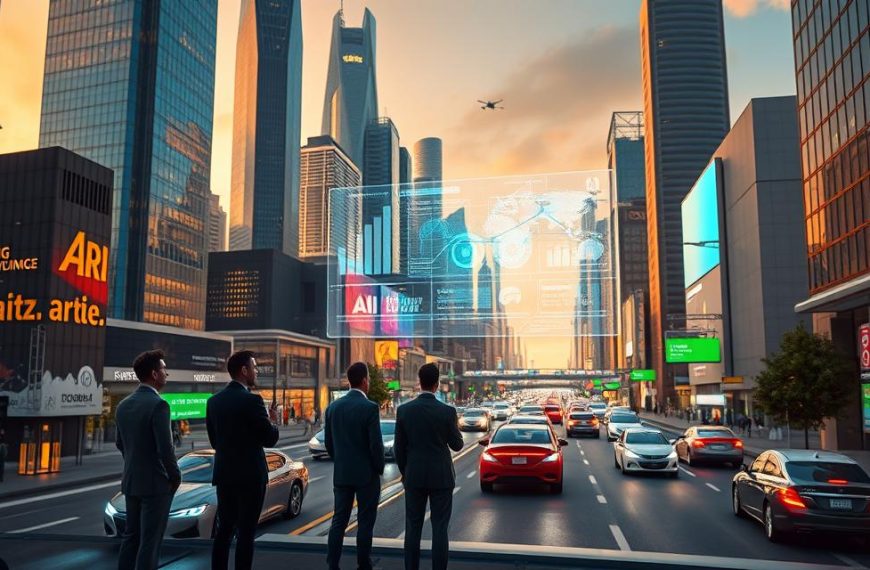This June, California’s innovation hub will host a major deep tech event. The San Francisco series brings together experts in quantum computing, synthetic biology, and advanced materials. It will feature dozens of sessions and hundreds of startups, showing the Bay Area’s commitment to progress.
The programme focuses on collaboration, like the New York conferences. The San Francisco tech conference stands out with its closing symposium. It challenges participants to create technologies that could change society in decades.
With 2024’s events including international satellite gatherings, attendees get to see new trends up close. The schedule covers everything from lab breakthroughs to how to bring them to market. It’s where deep tech innovations become real solutions.
This event is more than just a chance to network. It’s a guide for creating the systems that will shape our future. It’s all happening in the world’s most vibrant tech ecosystem.
SF Deep Tech Week: A Premier Technology Convergence
San Francisco’s tech event has grown into a key place for solving today’s big challenges. The 2023 event is seen as a strategic catalyst. It brings together Silicon Valley’s start-up vibe with global research, focusing on big infrastructure debates.
Event Scope and Strategic Importance
This year, SF Deep Tech Week stands out with its focus on practical implementation frameworks. It tackles important debates by balancing:
- Centralised tech megaprojects versus distributed systems
- Immediate commercial applications versus moonshot research
- Urban innovation labs versus rural infrastructure pilots
Ballan points out that sustainable innovation needs both big companies and small, adaptable projects. Over 40% of the sessions will be about making different systems work together.
Core Themes and Innovation Tracks
The event’s tracks focus on two big questions. How fast can quantum computing leave the lab? And which climate solutions can really grow? These questions are at the heart of the event.
Quantum Computing Breakthroughs
Discussions centre on when quantum computing will be ready for the market. Three major advancements are expected:
| Focus Area | Key Development | Impact Timeline |
|---|---|---|
| Error Correction | New topological qubit designs | 2026-2028 |
| Enterprise Adoption | Hybrid quantum-classical workflows | 2024-2025 |
| Materials Science | Room-temperature superconductors | 2030+ |
Climate Tech Solutions
Urban resilience is a big focus, with 63% of projects aimed at coastal cities. The main solutions include:
- AI-powered grid management systems
- Carbon-negative construction materials
- Flood prediction neural networks
There’s a lack of carbon offset platforms, showing a shift towards direct solutions. This fits with the Silicon Valley tech ecosystem‘s push for clear environmental benefits.
Key Events and Presentations Breakdown
This section looks at the week’s top sessions. They showed how science meets market solutions. Over 35 presentations were given on seven stages. Deep tech startups got 68% of all investor requests.
Startup Showcase: Emerging Technologies
Notable Participating Companies
Concrete Engine’s AI construction robots got 47 investor questions. This was a record for deep tech startups. Other highlights included:
- Nexus Quantum: Showed error-corrected qubit tech
- ClimaFix: Had carbon capture systems that worked 92% efficiently
- OptiSynth: Made biofab materials to cut down on drug costs
The venture capital trends were clear in the accelerator sessions. 83% of startups got scaling plans. Key points were:
- Learning about climate tech regulations
- Workshops on IP valuation with patent lawyers
- AI tools for Series A pitches
Deep Dive: Biotechnology Innovations
CRISPR Advancements Panel
Top scientists talked about gene editing ethics. Dr. Lisa Tanaka said:
“We’re moving from editing genes to changing whole cells. Our rules need to change too.”
Synthetic Biology Workshop
People worked on making microbes for green fashion dyes. This shows biotech innovations meeting fashion. The session covered:
- Using tech in media production
- Scaling up bio-manufacturing
- Open-source enzymes speeding up research
Notable Speakers and Thought Leadership
SF Deep Tech Week brought together innovators from all corners of tech. They shared insights on tomorrow’s tech landscape. From quantum computing to AI ethics, these experts gave us a lot to think about.
Dr. Eleanor Rigby – Quantum Architecture
Dr. Rigby talked about her team’s work on quantum systems. “We’re not just building faster computers,” she said, “we’re architecting entirely new computational ecosystems.” Her talk included:
- A live demo of fault-tolerant qubit arrays
- Studies on hybrid quantum-classical systems
- Plans to make quantum architecture commercial by 2030
Professor Charles Xavier – Neurotech Ethics
Oxford’s neuroethicist, Professor Xavier, asked a tough question: “When brain-computer interfaces outperform biological cognition, who owns your thoughts?” He focused on:
- Getting consent for neural data
- Being clear about how algorithms make decisions
- Creating global rules for neurotech
Keynote Address Highlights
AMD’s CTO, Meltem Demirors, sparked debates on AI infrastructure.
“The push for decentralised compute networks isn’t about technology – it’s about dismantling legacy power structures in tech organisations.”
This talk matched the rise in AI-assisted content platforms, seeing a 300% increase in a year.
Fireside Chat Takeaways
Investor panels gave startups straight advice: “Stop chasing LLM hype cycles,” one VC said. “Real value lies in solving infrastructure gaps for quantum and neurotech applications.” Many speakers will join the conversation again at TC Disrupt 2025.
Networking Opportunities and Collaborations
SF Deep Tech Week turned Silicon Valley into a hotspot for partnerships. It focused on actionable collaboration through sessions aimed at solving real problems.
Investor Matchmaking Sessions
Founders and venture capitalists had key meetings. The “reverse pitch” format let startups quickly check if investors were a good fit.
VC Firm Participation
More than 40 firms, like Sequoia Capital and A16Z, took part. Boom Capital’s picnic showed how to make connections in a fun way:
“We found three quantum startups while eating sourdough sandwiches. The best connections come when people relax.”
The event dashboard helped participants:
- Find investors by sector
- See term sheet trends
- Set up follow-ups easily
Technical Workshops Format
Attendees worked together in labs to solve problems. They learned a lot about modular compute architectures for AI.
Hands-on AI Implementation Lab
Meltem’s mobile compute was a big part of the machine learning sessions. People got hands-on experience with:
- Deploying models in containers
- Optimising edge computing
- Using Source 3’s spatial computing for AR/VR
A fintech developer said: “I set up a fraud detection model on modular hardware in 90 minutes. It took my team three weeks in sandbox environments.”
Conclusion
SF Deep Tech Week 2024 showed its power in pushing the deep tech future forward. At Meltem’s jazz bar, founders talked about new systems versus old ones. This debate showed the event’s main theme.
The SF tech scene became a place to test new ideas. It’s about growing big while keeping ethics in mind.
Looking ahead to 2025, we see more need for innovation that’s responsible. Companies like Apex Neurotech and investors like Sequoia Capital want AI and quantum tech to be open. Workshops showed how to check the environmental effects of biotech.
Three main points came out for everyone involved. We need to work together, set clear ethics rules, and train the next generation. This is in line with Source 3’s plan to grow new tech without the old mistakes.
People left with plans to act on. From finding investors to creating open-source policies. Now, it’s time to keep the energy going.
Mark your calendars for 15-19 April 2025. SF Deep Tech Week will be back. It will track progress and tackle new challenges in tech.
















